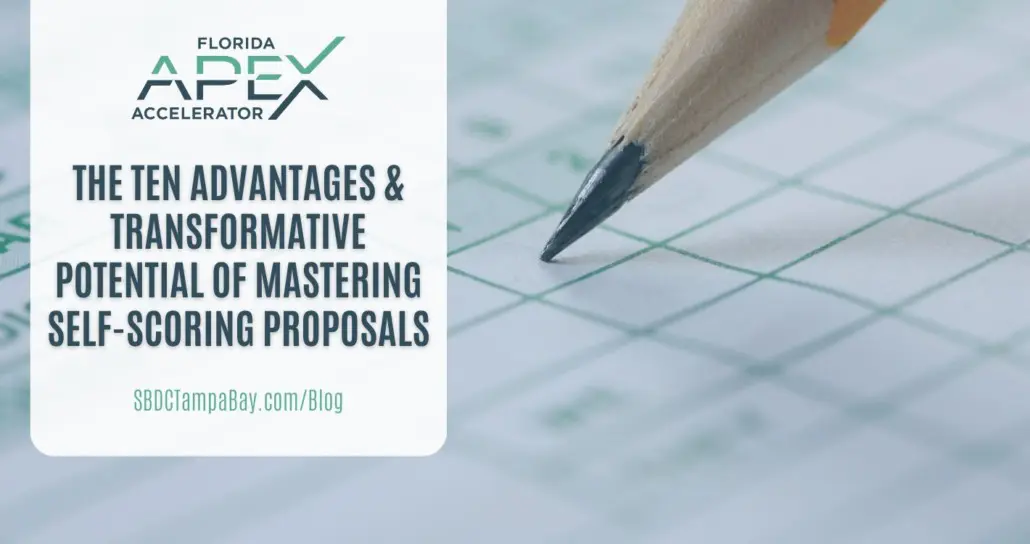The Ten Advantages & Transformative Potential of Mastering Self-Scoring Proposals

by Yolanda Goodloe | January 31, 2024
In the fast-paced realm of business, where competition is fierce and innovation is the lifeblood of success, the conventional approach to proposal evaluation is undergoing a transformative shift. Enter self-scoring proposals—an innovative methodology that not only injects a crucial element of objectivity into the evaluation process but also serves as a proactive tool for quality assurance. As we delve into the ten compelling advantages of mastering self-scoring proposals, we uncover a strategic pathway for businesses to refine their proposals, align with client needs, and efficiently allocate resources. This paradigm shift promises not only enhanced proposal quality but also the potential for government contractors to thrive in the dynamic landscape of modern business.
Self-Scoring Proposals
In the relentless pursuit of excellence, businesses are increasingly recognizing the need to adopt methodologies that go beyond the traditional. The self-scoring approach emerges as a beacon of change, allowing businesses to craft proposals tailored to specific client needs and objectives. As we navigate through the ten distinct advantages, from increased objectivity to efficient resource allocation, it becomes evident that self-scoring is not merely a process but a mindset—an iterative journey towards continuous improvement. This dynamic shift in the approach to proposal creation is not just about ticking boxes; it is about embracing a culture of innovation that propels businesses towards sustained growth and positions them as industry leaders.
The Ten advantages of Mastering Self-Scoring Proposals
Now, let’s explore the ten advantages of this new approach and the transformative potential of mastering self-scoring proposals.
- Increased Objectivity: Self-scoring proposals introduce an element of objectivity into the evaluation process. Businesses can objectively assess their proposals against predetermined criteria, reducing the influence of subjective biases that may arise during traditional evaluations.
- Improved Quality Assurance: The self-scoring approach serves as a proactive quality assurance tool. Businesses can identify potential shortcomings in their proposals early in the process, allowing for refinement and improvement before submission. This not only enhances the quality of proposals but also reflects a commitment to delivering excellence.
- Customization for Client Needs: Crafting a proposal that precisely aligns with a client’s specific needs is crucial for success. With self-scoring, businesses can tailor their proposals to meet the exact criteria that clients prioritize, increasing the chances of resonating with decision-makers.
- Efficient Resource Allocation: Time and resources are valuable assets in the business world. Self-scoring proposals enable businesses to allocate resources more efficiently by focusing on areas that need improvement. This targeted approach optimizes the proposal creation process, ensuring that efforts are directed toward the most impactful elements.
- Define Clear Evaluation Criteria: Establishing clear and relevant evaluation criteria is the foundation of self-scoring proposals. Collaborate with key stakeholders to identify the most critical aspects of a successful proposal and translate them into measurable criteria.
- Implement a Robust Scoring System: Create a scoring system that aligns with the identified criteria. This system should provide a numerical value to each aspect of the proposal, facilitating a quantitative evaluation. Consider weighted scoring to reflect the varying importance of different criteria.
- Iterative Improvement Process: Treat self-scoring as an iterative process. After each proposal submission, gather feedback from the evaluation and use it to refine the scoring criteria and methodology. Continuous improvement is key to maximizing the effectiveness of self-scoring.
- Identifying Weaknesses Early: Self-scoring enables proposers to identify and address weaknesses in qualifications before submission, contributing to a stronger proposal.
- Understanding Client Expectations: Aligning self-scoring criteria with client expectations provides insight into priorities, allowing proposers to tailor qualifications accordingly.
- Effective Communication: Using a scoring system to evaluate qualifications communicates strengths objectively, offering a compelling and persuasive case to evaluators.
In the dynamic world of business, innovation is the key to staying ahead. Self-scoring proposals represent a paradigm shift in how businesses approach the crucial task of proposal creation. By embracing this method, businesses can foster objectivity, enhance proposal quality, and ultimately increase their chances of success in the competitive landscape. As businesses continue to evolve, the adoption of self-scoring proposals may very well become a defining factor in achieving sustainable growth and securing coveted opportunities.





Yolanda Goodloe
Consultants, Cowart, Government Contracting Consultants, PinellasSpecialty: Procurement Yolanda Goodloe has more than 20 years of experience in public service at the local and municipal levels. Early in her career, she worked as a human resources and relations professional while serving as a liaison to the business community and advocacy groups. Her prior experience includes being a human relations specialist for Lee County Government, and an equal opportunity director for the City of Fort Lauderdale. Her background combines public service and human relations experience with hands on leadership in equal opportunity, supplier diversity, business certifications programs, organizational training and development, and managing workforce diversity principles. Goodloe is the procurement specialist for the Florida PTAC at Pinellas County Economic Development. She connects businesses to resources and tools for state, local, and federal contracting opportunities. She is a Certified Procurement Professional (CPP), a Supply Chain Management Professional (SCMP), and a Certified Verification Counselor. She graduated from Florida State University with a bachelor of arts in political science and history.